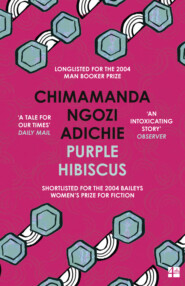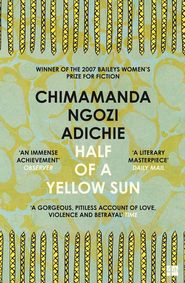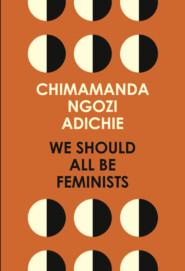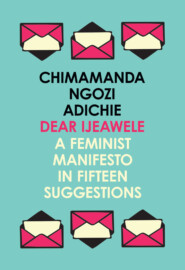По всем вопросам обращайтесь на: info@litportal.ru
(©) 2003-2024.
✖
Half of a Yellow Sun, Americanah, Purple Hibiscus: Chimamanda Ngozi Adichie Three-Book Collection
Автор
Год написания книги
2018
Настройки чтения
Размер шрифта
Высота строк
Поля
‘Yes, Mama.’
‘I will not let this witch control him. She will not succeed. I will consult the dibia Nwafor Agbada when I return home; the man’s medicine is famous in our parts.’
Ugwu stopped. He knew many stories of people who had used medicine from the dibia: the childless first wife who tied up the second wife’s womb, the woman who made a neighbour’s prosperous son go mad, the man who killed his brother because of a land quarrel. Perhaps Master’s mother would tie up Olanna’s womb or cripple her or, most frightening of all, kill her.
‘I am coming, Mama. My master sent me to the kiosk,’ Ugwu said, and hurried out through the back door before she said anything. He had to tell Master. He had been to Master’s office only once, driven in Olanna’s car when she stopped by to pick up something, but he was sure he could find it. It was near the zoo and his class had visited the zoo recently, walking in a single file led by Mrs Oguike, and he had brought up the rear because he was the tallest.
At the corner of Mbanefo Street, he saw Master’s car coming towards him. It stopped.
‘This isn’t the way to the market, is it, my good man?’ Master asked.
‘No, sah. I was coming to your office.’
‘Has my mother arrived?’
‘Yes, sah. Sah, something happened.’
‘What?’
Ugwu told Master about the afternoon, quickly recounting the words of both women, and finished with what was the most horrible of all: ‘Mama said she will go to the dibia, sah.’
‘What rubbish,’ Master said. ‘Ngwa, get into the car. You might as well drive back home with me.’
Ugwu was shocked that Master was not shocked, did not understand the gravity of the situation, and so he added, ‘It was very bad, sah. Very bad. Mama nearly slapped my madam.’
‘What? She slapped Olanna?’ Master asked.
‘No, sah.’ Ugwu paused; perhaps he had gone too far with the suggestion. ‘But it looked as if she wanted to slap my madam.’
Master’s face relaxed. ‘The woman has never been very reasonable, at any rate,’ he said, in English, shaking his head. ‘Get in, let’s go.’
But Ugwu did not want to get into the car. He wanted Master to turn around and go to Olanna’s flat right away. His life was organized, secure, and Master’s mother would have to be stopped from disrupting things; the first step was for Master to go and placate Olanna.
‘Get into the car,’ Master said again, reaching across the front seat to make sure the door was unlocked.
‘But, sah. I thought you are going to see my madam.’
‘Get in, you ignoramus!’
Ugwu opened the door and climbed in, and Master drove back to Odim Street.
5 (#u3c1576f1-c916-57b7-bb43-a63c028a7109)
Olanna looked at Odenigbo through the glass for a while before she opened the door. She closed her eyes as he walked in, as if doing so would deny her the pleasure that the scent of his Old Spice always brought. He was dressed for tennis in the white shorts she had often teased him were too tight around his buttocks.
‘I was talking to my mother or I would have come earlier,’ he said. He pressed his lips to hers and gestured to the old boubou she was wearing. ‘Aren’t you coming to the club?’
‘I was cooking.’
‘Ugwu told me what happened. I’m so sorry my mother acted that way.’
‘I just had to leave … your house.’ Olanna faltered. She had wanted to say our house.
‘You didn’t have to, nkem. You should have ignored her, really.’ He placed a copy of Drum magazine down on the table and began pacing the room. ‘I’ve decided to talk to Dr Okoro about the Labour Strike. It’s unacceptable that Balewa and his cronies should completely reject their demands. Just unacceptable. We have to show support. We can’t allow ourselves to become disconnected.’
‘Your mother made a scene.’
‘You’re angry.’ Odenigbo looked puzzled. He sat down in the armchair, and for the first time she noticed how much space there was between the furniture, how sparse her flat was, how unlived in. Her things were in his house; her favourite books were in the shelves in his study. ‘Nkem, I didn’t know you’d take this so seriously. You can see that my mother doesn’t know what she’s doing. She’s just a village woman. She’s trying to make her way in a new world with skills that are better suited for the old one.’ Odenigbo got up and moved closer to take her in his arms, but Olanna turned and walked into the kitchen.
‘You never talk about your mother,’ she said. ‘You’ve never asked me to come to Abba with you to visit her.’
‘Oh, stop it, nkem. It’s not as if I go that often to see her, and I did ask you the last time but you were going to Lagos.’
She walked over to the stove and ran a sponge on the warm surface, over and over, her back to Odenigbo. She felt as if she had somehow failed him and herself by allowing his mother’s behaviour to upset her. She should be above it; she should shrug it off as the ranting of a village woman; she should not keep thinking of all the retorts she could have made instead of just standing mutely in that kitchen. But she was upset, and made even more so by Odenigbo’s expression, as if he could not believe she was not quite as high-minded as he had thought. He was making her feel small and absurdly petulant and, worse yet, she suspected he was right. She always suspected he was right. For a brief irrational moment, she wished she could walk away from him. Then she wished, more rationally, that she could love him without needing him. Need gave him power without his trying; need was the choicelessness she often felt around him.
‘What did you cook?’ Odenigbo asked.
‘Rice.’ She rinsed the sponge and put it away. ‘Aren’t you going to play tennis?’
‘I thought you would come.’
‘I don’t feel up to it.’ Olanna turned around. ‘Why is your mother’s behaviour acceptable because she’s a village woman? I know village women who do not behave this way.’
‘Nkem, my mother’s entire life is in Abba. Do you know what a small bush village that is? Of course she will feel threatened by an educated woman living with her son. Of course you have to be a witch. That is the only way she can understand it. The real tragedy of our postcolonial world is not that the majority of people had no say in whether or not they wanted this new world; rather, it is that the majority have not been given the tools to negotiate this new world.’
‘Did you talk to her about this?’
‘I didn’t see the point. Look, I want to catch Dr Okoro at the club. Let’s discuss this when I get back. I’ll stay here tonight.’
She paused as she washed her hands. She wanted him to ask her to come back with him to the house, wanted him to say he would tell his mother off in front of her, for her. But here he was deciding to stay at her flat, like a frightened little boy hiding from his mother.
‘No,’ she said.
‘What?’
‘I said no.’ She walked into the living room without drying her hands. The flat seemed too small.
‘What is wrong with you, Olanna?’
She shook her head. She would not let him make her feel that there was something wrong with her. It was her right to be upset, her right to choose not to brush her humiliation aside in the name of an overexalted intellectualism, and she would claim that right. ‘Go.’ She gestured towards the door. ‘Go and play your tennis and don’t come back here.’
She watched him get up and leave. He banged the door. They had never had a quarrel; he had never been impatient with dissent from her as he was with others. Or it may simply be that he humoured her and did not think much of her opinions in the first place. She felt dizzy. She sat alone at her bare dining table – even her table mats were in his house – and ate the rice. It tasted bland, nothing like Ugwu’s. She turned the radio on. She thought she heard rustles in the ceiling. She got up to go visit her neighbour Edna Whaler; she had always wanted to get to know the pretty black American woman who sometimes brought her cloth-covered plates of American biscuits. But she changed her mind at the door and didn’t step out. After she left the half-eaten rice in the kitchen, she walked around the flat, picking up old newspapers and then putting them down. Finally, she went to the phone and waited for the operator.
‘Give me the number quick, I have other things to do,’ the lazy, nasal voice said.
Olanna was used to unprofessional and inept operators, but this was the rudest she had experienced.
‘Haba, I will cut this line if you keep wasting my time,’ the operator said.









